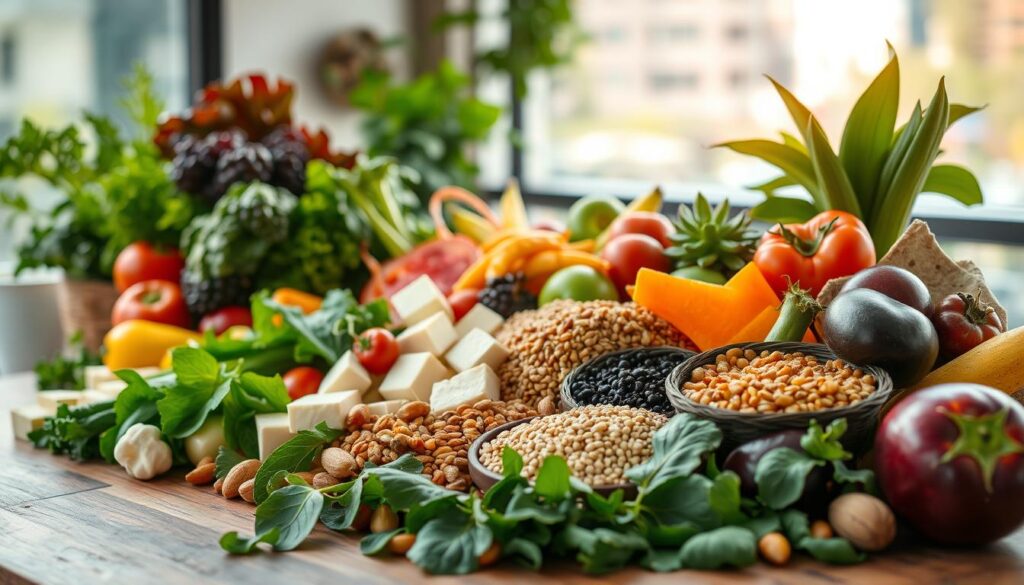Have you ever thought about how one food choice could change your health and life span? The plant-based diet is a powerful choice for those wanting to live their best life.
Starting your health journey means learning about the amazing plant-based diet benefits. Studies show that eating plants is not just a trend. It’s a proven way to boost your health and energy.
Choosing a plant-based diet is more than just good food. It’s a way to care for your body and the planet. It helps your body heal, lowers disease risks, and supports the environment.
Key Takeaways
- Plant-based diets can lower risk of chronic diseases
- Improves overall cardiovascular health
- Supports sustainable weight management
- Enhances digestive system functionality
- Provides essential nutrients through whole food sources
- Reduces environmental impact
Understanding Plant-Based Diets: A Comprehensive Guide
Plant-based nutrition is getting more popular. People want to eat healthier and better for the planet. Starting your vegan or vegetarian journey means learning about different plant-based diets.
Experts now see many ways to eat plant-based. Each method has its own health perks and lifestyle benefits.
Types of Plant-Based Diets
- Vegetarian: Doesn’t include meat but might have dairy and eggs
- Pescatarian: Adds fish to plant foods
- Flexitarian: Mostly plants with some meat
- Vegan: No animal products at all
- Mediterranean: Focuses on plants with little animal protein
Key Components of Plant-Based Eating
Plant-based diets focus on whole, nutrient-rich foods. These foods give you the vitamins and minerals you need. Your diet should have:
- Fresh fruits and vegetables
- Whole grains
- Legumes and beans
- Nuts and seeds
- Plant-based proteins
“Food is the most powerful tool for preventing and reversing disease.” – Dr. Michael Greger
Difference Between Vegan and Plant-Based
Vegan and plant-based diets are often confused, but they’re not the same. Vegan diets don’t include any animal products. Plant-based diets focus on plants but might include some animal products.
| Diet Type | Animal Products | Primary Focus |
|---|---|---|
| Vegan | None | Ethical and environmental concerns |
| Plant-Based | Minimal or optional | Health and nutrition |
Knowing these differences helps you pick a diet that fits your health goals and lifestyle.
Plant-Based Diet Benefits: Essential Health Advantages
Exploring the benefits of a plant-based diet can change how you view health. Studies show that eating more plant-based foods is good for your overall health.
Plant-based eating does more than just feed your body. It gives you important nutrients, antioxidants, and compounds that help keep you healthy.
- Reduces risk of chronic diseases
- Supports immune system function
- Promotes natural weight management
- Increases nutrient intake
Research proves that plant-based diets are good for your health. Whole foods from plants protect against many health issues. They are key for staying healthy over time.
“Food is the most powerful medicine we have access to.” – Dr. Michael Greger
Your body needs the nutrients in fruits, veggies, whole grains, legumes, and nuts. These foods are full of vitamins, minerals, and phytonutrients. They help keep your cells healthy and prevent diseases.
Choosing plant-based nutrition is a smart way to take care of your health. It improves your heart health and helps your body work better.
Heart Health and Cardiovascular Protection
Plant-based diets are great for your heart. They are full of good nutrients and low in bad fats. This can make your heart much healthier. By eating plant-based foods, you help prevent diseases and support your body’s healing.
Your diet is key to a healthy heart. Studies show that eating plants can lower heart disease risks a lot.
Lowering Blood Pressure Naturally
A plant-based diet helps manage blood pressure naturally. Here are some ways:
- Eat more potassium-rich veggies
- Drink less sodium
- Eat more whole grains
- Keep a healthy weight
Reducing Cholesterol Levels
Plant-based foods are good for cholesterol. Fiber-rich foods like beans and whole grains help remove bad cholesterol.
Preventing Heart Disease
Choosing plant-based foods can lower heart disease risks. Research shows that people who eat this way have:
- Lower inflammation
- Better blood vessel function
- Less chance of heart problems
“Your diet is a powerful tool for maintaining heart health and preventing chronic diseases.” – American Heart Association
Adding more plant-based foods to your diet is smart for health. Your heart will be grateful for these healthy choices.
Weight Management and Metabolic Health
Plant-based nutrition can change your weight loss journey and improve your metabolic health. It offers a natural way to manage weight with foods that are full of nutrients. These foods keep you feeling full and give you energy.
Plant-based foods are special for weight loss. They have fewer calories but are packed with important nutrients. Your body gets:
- High fiber content that promotes fullness
- Lower calorie density compared to processed foods
- Improved metabolic function
- Enhanced insulin sensitivity
Studies show that people on a plant-based diet lose weight better. Nutrient-rich vegetables, fruits, whole grains, and legumes work together to help manage weight naturally. They support your metabolism, helping you lose weight without feeling hungry.
Your body is a complex system that thrives on whole, plant-based nutrition.
Weight loss is easier when you focus on nutrition quality, not just counting calories. Plant-based diets help your metabolic health by reducing inflammation. They support your body’s natural weight control.
Choosing plant-based nutrition helps you reach your weight loss goals. It also nourishes your body with vitamins, minerals, and antioxidants. Start your journey to a healthier you with mindful food choices that support your weight and metabolic wellness.
Cancer Prevention and Immune System Support
Good nutrition is key to staying healthy. Eating plants can boost your body’s defenses against big health threats. Learning how diet affects our cells shows how what we eat matters a lot.
Plant foods are great for your immune system. They’re full of nutrients that help keep your cells safe.
Anti-inflammatory Properties
Too much inflammation can lead to many diseases. Plant-based diets fight inflammation with special compounds:
- Less inflammation
- Better cell repair
- Less damage from free radicals
Antioxidant Benefits
Antioxidants protect our cells from harm. Different plants have different antioxidants:
| Plant Source | Key Antioxidants | Health Benefits |
|---|---|---|
| Berries | Anthocyanins | Cell protection |
| Leafy Greens | Carotenoids | Boosts immune system |
| Nuts | Vitamin E | Reduces oxidative stress |
Cancer Risk Reduction
Studies show plant-based diets can lower cancer risks. Eating whole foods helps prevent disease.
Choosing a diet full of plants is a smart health move. What you eat now can shape your future health.
Digestive Health and Gut Microbiome
Your digestive system is key to your health. Eating plants can change your gut for the better. Plant foods are full of fiber, helping your digestion.
Knowing about gut health means understanding the tiny world in your stomach. Plant-based nutrition feeds the good bacteria in your gut. This is important for staying healthy.
- Promotes healthy digestion
- Supports beneficial gut bacteria growth
- Reduces inflammation
- Helps regulate blood sugar levels
Plant foods do more than just fill your belly. Fermentable fibers in veggies, fruits, and grains feed your gut’s good bacteria. This boosts your immune system.
| Plant Food | Gut Health Benefits |
|---|---|
| Legumes | High in resistant starch, supports microbiome diversity |
| Leafy Greens | Rich in fiber, reduces gut inflammation |
| Fermented Foods | Introduces beneficial probiotics |
Choosing plant-based foods can make your digestive system strong. Your gut microbiome will be grateful for your healthy food choices. This supports your health for years to come.
Environmental Impact and Sustainability
Choosing a plant-based diet does more than just help your health. It also helps the planet. Eating ethically is a big step towards reducing our carbon footprint and protecting nature.
Carbon Footprint Reduction
Plant-based diets cut down on greenhouse gas emissions a lot. Animal farming is a big source of carbon dioxide. By eating more plants, you can help lower carbon emissions.
- Meat production generates 14.5% of global greenhouse gases
- Plant-based diets can reduce individual carbon footprints by up to 73%
- Choosing vegetables over meat saves significant atmospheric carbon
Water Conservation Benefits
Water use in food production is very different for plants and animals. Understanding these differences helps us see the importance of sustainability.
| Food Source | Water Required (Gallons/Pound) |
|---|---|
| Beef | 1,800 |
| Chicken | 468 |
| Tofu | 302 |
| Vegetables | 34 |
Sustainable Food Production
Eating ethically supports farming that keeps ecosystems safe. Plant-based diets need less land, water, and energy than animal farming. Your choices can make the global food system more sustainable.
- Reduced land use for agricultural purposes
- Decreased deforestation rates
- Lower environmental degradation
Essential Nutrients in Plant-Based Diets
Switching to a plant-based diet means paying close attention to what you eat. Your body needs the right mix of nutrients to stay healthy. Plant-based proteins are a great start for a balanced lifestyle.
Knowing about important nutrients is key for a healthy plant-based diet. Many people worry about getting enough protein. But, there are plenty of plant-based options to meet your needs.
- Legumes: Beans, lentils, and chickpeas
- Nuts and seeds: Almonds, chia seeds, and hemp seeds
- Whole grains: Quinoa, amaranth, and brown rice
- Plant-based protein powders: Pea, hemp, and brown rice protein
Some nutrients need extra focus in a plant-based diet. Vitamin B12, iron, and calcium are important. You’ll need to plan your diet carefully to get enough of these.
| Nutrient | Plant-Based Sources | Daily Recommended Intake |
|---|---|---|
| Vitamin B12 | Fortified nutritional yeast, plant milks | 2.4 mcg |
| Iron | Spinach, lentils, tofu | 8-18 mg |
| Calcium | Kale, fortified plant milks, almonds | 1000-1200 mg |
Think about talking to a registered dietitian. They can help create a nutrition plan just for you. This plan will make sure you get all the nutrients you need. And you’ll enjoy a wide variety of tasty plant-based foods.
Making the Transition to Plant-Based Eating
Switching to a plant-based diet takes time. Experts suggest starting slow to make lasting changes. Learning key strategies helps you adopt plant-based nutrition with confidence.
Starting a plant-based diet needs careful planning and practical tips. Begin with small steps that help build good eating habits.
Meal Planning Strategies
Good meal planning is key to enjoying plant-based diet benefits. Here are some helpful tips:
- Start with Meatless Mondays to introduce plant-based meals
- Replace one animal protein with plant protein weekly
- Experiment with diverse international cuisines
- Prep meals in advance to ensure nutrition consistency
Shopping Guidelines
Shopping for a new diet can be tough. Focus on whole foods and learn to read labels well.
- Shop the perimeter of the store
- Purchase seasonal produce
- Stock up on plant-based protein sources
- Try new plant-based alternatives monthly
Kitchen Essentials
Having the right kitchen tools makes cooking plant-based food fun. Invest in tools that help you meet your nutritional goals.
- High-powered blender
- Food processor
- Quality chef’s knife
- Variety of storage containers
Consistent, mindful choices lead to the best plant-based diet benefits. Enjoy the journey with patience and curiosity.
Common Challenges and Solutions
Starting a vegetarian or vegan diet can be tough. You might face challenges like social situations, nutritional worries, and getting used to new foods. Knowing these hurdles can help you smoothly move into a plant-based lifestyle.
Social events can be the biggest challenge for vegans. Going out to eat, joining family gatherings, or attending work parties can be hard when you eat differently than others.
- Prepare meals in advance for social events
- Communicate your dietary preferences clearly
- Offer to bring a dish to share
- Research restaurant menus beforehand
Worries about getting enough nutrients are common. You need to plan your meals carefully to get enough protein, vitamins, and minerals.
| Nutrient | Plant-Based Sources | Daily Recommended Intake |
|---|---|---|
| Protein | Legumes, tofu, tempeh | 0.8g per kg body weight |
| Vitamin B12 | Fortified nutritional yeast, supplements | 2.4 mcg |
| Iron | Spinach, lentils, quinoa | 8-18 mg |
Getting used to new tastes and textures can be hard. Try new herbs, spices, and cooking methods to make your plant-based meals tasty and fun.
“The key to successful veganism is approaching dietary changes with curiosity and openness.” – Dr. Neal Barnard, Physician and Nutrition Researcher
Remember, changing your diet takes time. Be kind to yourself, find support in vegan groups, and enjoy the health and environmental perks of your choice.
Longevity and Quality of Life Benefits
Want to live longer and healthier? It might be easier than you think. Studies show that eating plants can help prevent diseases and keep you healthy as you get older.
Blue zones around the world offer clues to a long life. Places with many centenarians have one thing in common: they eat a lot of plants. What you eat can really affect how well you age.
- Protect cognitive function
- Reduce risk of age-related diseases
- Maintain metabolic health
- Support cellular regeneration
Scientists have found amazing benefits of eating plants for long-term health. Plant foods are full of antioxidants and nutrients. They help fix cells, lower inflammation, and prevent diseases that come with age.
| Health Aspect | Plant-Based Diet Impact |
|---|---|
| Cardiovascular Health | Reduces heart disease risk by 32% |
| Cognitive Function | Slows age-related mental decline |
| Inflammation | Decreases chronic inflammatory markers |
Choosing a plant-based diet does more than just add years to your life. It adds life to your years. Eating nutrient-rich foods and focusing on disease prevention can change how you view aging and wellness.
“Eat food. Not too much. Mostly plants.” – Michael Pollan
Conclusion
Your journey into plant-based diets is more than just food. It’s a way to improve your health and help the planet. Plant-based diets offer many benefits, from better health to protecting the environment.
Adding more plant-based meals to your diet can greatly improve your health. It can lower the risk of chronic diseases and help with weight management. These diets are also good for the planet, reducing carbon footprints.
You don’t have to change everything at once. Small steps can lead to big health gains. Start by adding more veggies, legumes, and whole grains to your meals. Every choice you make brings you closer to a healthier life and a greener planet.
Choosing a plant-based diet is a smart choice for you and the world. It’s backed by science and offers many benefits. It’s a way to take care of yourself and make a positive difference globally.






